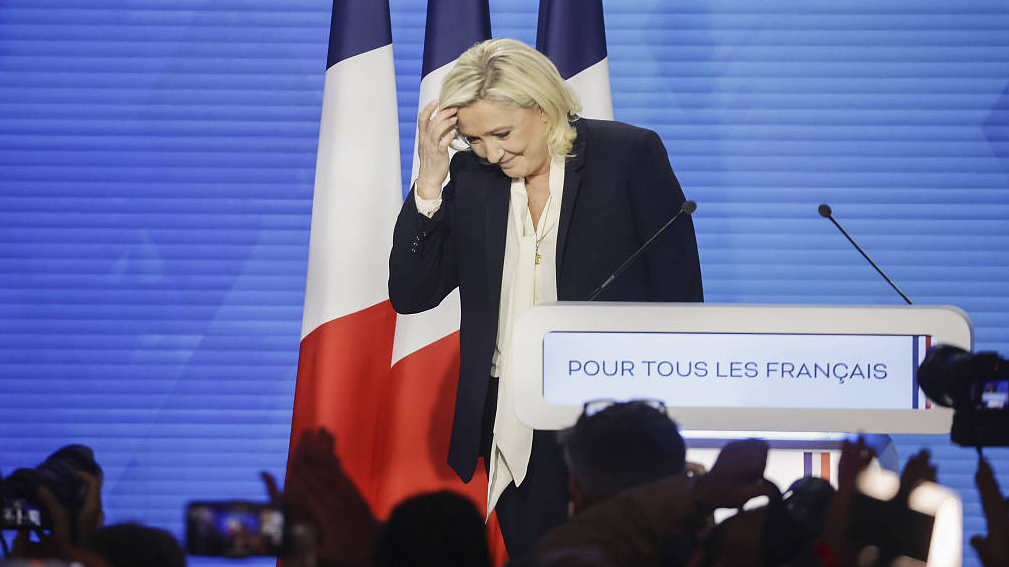04:49

Marine Le Pen failed in her third attempt to become France's first female president, as the incumbent Emmanuel Macron won his second five-year term on April 24's election. But in her concession speech, the leader of the far-right National Rally called her loss a "resounding victory," as more than 41 percent of the voters were on her side this time, compared to 33.9 percent in 2017.
Le Pen's policies and populist rhetoric markedly gained traction in France over the past few years. In his victory speech in 2017, Macron promised he would do all he can during his term to make sure Le Pen's supporters "no longer have a reason to vote for an extreme position." Yet after five years, Macron lost two million votes, while Le Pen gained three million.
Le Pen has expressed her discontent with the U.S.-led North Atlantic Treaty Organization (NATO), stressing in early March that France does not wish to be "dragged into other people's conflicts," referring to the ongoing conflict in Ukraine. On April 13, she promised to take France out of NATO's integrated military command structure if elected, to restore the nation's sovereignty on security matters: A repeat of what formal French President Charles de Gaulle did in 1966.

French National Rally presidential candidate Marine Le Pen gestures at the headquarters of her campaign, Paris, France, April 24, 2022. /VCG
French National Rally presidential candidate Marine Le Pen gestures at the headquarters of her campaign, Paris, France, April 24, 2022. /VCG
After WWII, the world shifted into a bipolar standoff between the U.S.-led West and the Soviet Union-led East. De Gaulle, a famed general who experienced the fall of France in 1940 and led the French Resistance against Nazi occupation, aimed to return France to its former prestige and power, instead of falling under the wings of a stronger ally.
During his presidency, De Gaulle pursued an independent foreign policy in an effort to distance France from the sphere of influence of the U.S. France withdrew its Mediterranean fleet from NATO command in 1959 after the U.S. and the UK rejected its request for political parity. Subsequently, De Gaulle demanded all U.S. nuclear weapons to be removed from French territory, and pushed for France to develop its own nuclear technologies so the country would be capable of deterrence. In 1960, France became the fourth nuclear power in the world. Six years later, France officially announced its withdrawal from NATO's military command, and remained so until President Nicolas Sarkozy reversed the decision in 2009. France is now the only country in the European Union to have nuclear weapons.
In parallel with De Gaulle's vision for France as "an indomitable entity," Le Pen sees France as "a big power that counts," and not a "middle nation." When the U.S. hijacked a 56-billion-euro ($61.89 billion) submarine deal between France and Australia last year, Le Pen called it "a public humiliation" for France, and harshly criticized Macron for his "failure."
Although defeated in the presidential election, Le Pen believes her party is still in an "excellent position" to win parliamentary majority in June. The political system of France allows a "cohabitation," meaning that the president and the prime minister can come from different parties, according to French political analyst Alexandre Kouchner, who said Macron has only won a "hollow victory."
"Should Emmanuel Macron not be able to have a clear majority in the parliament, he could have to deal with a government he does not control," Kouchner told CGTN's The World Today program.
Facing uncertainties such as rising cost of living, Russia-Ukraine conflict and COVID-19, French people are not all on the same page about their country's potential withdrawal from NATO.
Thomas, a nursing assistant, considered military cooperation between allies key to "protect their populations and maintain civil security," and therefore disagreed with Le Pen's plan to leave the alliance. Laurent Pardo, a medical company employee, supported the withdrawal because "it would be good for France to regain its sovereignty."
France quitting NATO is harder than it seems, according to Abdelaziz Delazi, the head of an architectural firm who held a neutral stance on the matter. The 30-member alliance is still the only organization that can provide a "practical and coherent military resource" for Europe to tackle crises such as the ongoing Russia-Ukraine conflict. To replace NATO protection, Europe needs to develop a military force competent enough to hold its own.
"(Withdrawing from NATO) would require an increase in the French military budget, or we would need to put in place a genuine common European army, a common European defense with the same weapons (as NATO) and a common deterrence force," Delazi told CGTN.

